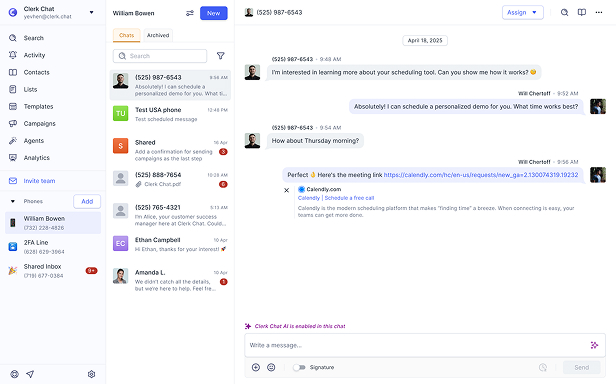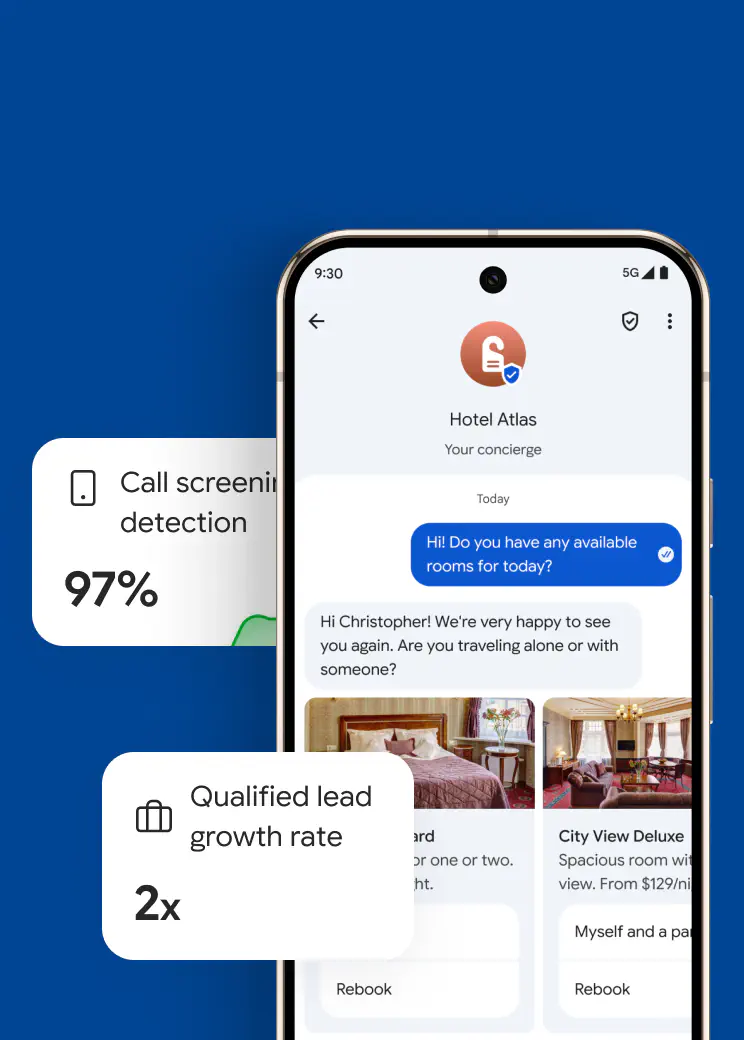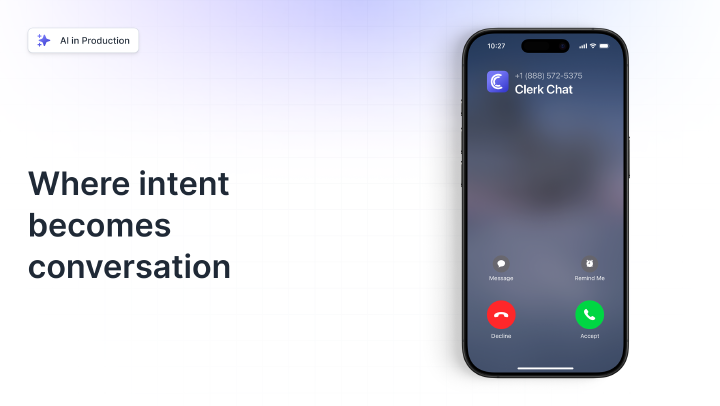Conversational AI for Sales: Benefits, Use Cases, Tools & What’s Next
By William Bowen
- Updated: September 18, 2025
If your sales playbook still relies on voicemails, cold emails, and “following up next week,” it’s time for a change. That world’s gone. The best sales teams today aren’t just using CRMs and email automations; they’re running full workflows through conversational AI for sales.
Conversational AI tools can qualify leads, book meetings, follow up automatically, and remind your reps what to say, before they forget the name of the prospect they’re calling.
It’s not about replacing humans. It’s about letting humans focus on the parts of the sale that still matter: connection, relationships, and closing. Everything else? Bots have it covered.
According to studies, almost 50% of buyers are open to buying via chatbot. Salesforce found 81% of sales leaders are already using AI, and 83% say their revenue grows when they do.
You can call it automation. You can call it scaling. But the simple version is: it’s getting your pipeline moving faster, without burning out your team.
With conversational AI for sales teams, companies accomplish more, deliver more personalized customer service at scale, and drastically cut costs.
If you’re not taking advantage, you’re falling behind.
In this article:
What is Conversational AI for Sales?
Conversational AI (artificial intelligence) is a type of artificial intelligence that can understand and mimic human conversation. It draws on machine learning and natural language processing capabilities, to ensure computer systems and software can recognize and respond to natural language.
Conversational AI tools come in many forms, from analytical solutions that enable sentiment analysis, to intelligent IVR systems. For sales teams, however, most conversational AI tools take the forms of bots or virtual agents that customers or team members can interact with.
Notably though, these AI chatbots aren’t the same as old-fashioned bots. Traditional bots weren’t really intelligent, they could simply respond to specific terms with pre-programmed replies.
Conversational AI for sales uses natural language processing, machine learning, and natural language understanding (NLU) to deliver human-like conversation and improve over time. You’re not just building another question and answer bot, you’re getting agents that:
- Qualify leads at midnight without making your reps work weekends
- Push contact info and call notes directly into your CRM
- Handle routine inquires for customer support teams
- Follow up after a webinar without needing a trigger-happy SDR
- Help a rep mid-call with suggestions, reminders, even product answers
- Deliver personalized recommendations through the customer journey
Conversational AI finally connects all the pieces in the sales journey that should have been connected years ago, allowing businesses to align with customer expectations.
Conversational AI vs Chatbots:
You’ve seen the basic bots. “What’s your name?” “What’s your email?” “Someone will get back to you.” That’s not conversational AI for sales. That’s a task-specific chatbot doing intake, and probably handing the lead off to a black hole.
| Feature | Old-School Chatbot | Conversational AI |
|---|---|---|
| Style | Form disguised as chat | Conversation that adapts |
| Brain | Fixed logic tree | Real-time learning via NLU |
| Smarts | Keyword matching | Intent recognition + context |
| Escalation | Fails silently | Routes to live agent at right time |
| Tools | Buttons, scripts | CRM sync, scheduling, end-to-end automation tools |
Conversational AI doesn’t ask for your email and stop there. It keeps going. It remembers you. It knows what you looked at last time. It nudges you to take action, and does it in a language that makes sense, via text or voice.
Plus, when your knowledge-based chatbots can’t answer a question, they don’t just give up. They pass the full conversation onto a human rep, with all the history, notes, and tags already logged.
A true AI-powered chatbot, one powered by conversational AI, supports your team, enhances efficiency, and improves user experience, one interaction at a time.
Does your sales playbook include AI? It's time to rewrite your rules of engagement.
The Use Cases of Conversational AI for Sales Teams
The market for conversational AI tools is growing rapidly, set to reach a value of $44.38 billion by 2031, and the biggest benefit of these tools is their ability to enhance customer interactions.
For everything from marketing, to sales, and even customer service, conversational AI is changing the script. Conversational AI for sales teams isn’t just about having a smarter chatbot on your site. The best tools now sit at the center of your outbound, inbound, and internal sales workflows.
Companies are tapping into tools for conversational marketing strategies, qualifying leads with AI agents, and keeping the conversation with human-first artificial intelligence for customer service.
Enhancing Lead Generation and Outreach
Sales professionals spend a lot of time identifying leads, and trying to connect with them for the first time. AI solutions can help streamline this process. Intelligent tools, like the AI agents built into the HubSpot platform or connected with a database, can fill your pipeline fast.
For instance, a conversational commerce bot could proactively engage customers on a range of channels, from your website, to social media, and introduce them to potential products and services. That virtual assistant could then transfer information gathered during an initial conversation to a sales agent, so they can follow up with a more personalized sales strategy.
Leading platforms supporting conversational AI lead generation even support advanced targeting rules to ping leads the moment they fit your ICP, before your competitors even know they exist.
Lead Scoring & Qualification in Real Time
The average SDR spends hours manually qualifying leads that go nowhere. Conversational AI fixes that. Bots can ask discovery questions on the spot: “How big is your team?” “What problem are you solving?” “What tools do you use today?”
Using custom branching logic, the bot adapts its line of questioning based on the lead’s answers, then auto-scores the result. High score? Push to your rep. Low score? Nurture automatically.
Speaking of nurturing, conversational AI can handle that too. Studies suggest it takes an average of eight touchpoints to turn a lead into a customer. However, a lot of sales agents struggle to find the time to follow-up regularly with prospects. With conversational AI for sales, professionals can hand some of the follow-up process over to a bot.
For example, once a company collects contact details from a potential lead, they could use the conversational SMS solution on Clerk Chat to schedule messages to be sent to that lead at specific times, introducing them to additional products, or inviting them to schedule an appointment.
These bots can even follow-up with prospects after they take specific actions, like signing up for a webinar, or requesting a “call back” from a sales professional.
Instant Scheduling, No Back-and-Forth
For sales teams, conversational AI lead generation, and lead scoring is just the start. When a lead says, “Let’s book a demo,” they mean now, not three emails later. AI tools can suggest slots from your reps’ calendars using real-time CRM integration, then confirm the meeting on the spot through an appointment-scheduling app.
The same tools can use information capture prompts to gather insights before passing a customer onto an agent. They can analyze the details of a customer profile, understand their needs, and send them to the agent with the right skills to close the deal.
These AI bots can even provide agents with up-to-date information about a lead, such as the questions they’ve asked about products previously.
Answering Customer Questions
Customer service and sales often goes hand in hand. Before a buyer actually purchases a product, they’ll usually have questions they need answered. Using conversational AI for customer service gives companies the opportunity to answer common buyer questions 24/7.
AI in call centers can immediately respond to any messages a company receives about a product, service, or potential deal, helping to streamline the path to conversion. Plus, after a customer converts, these AI tools can enhance satisfaction and retention rates going forward.
Because AI tools help to reduce the customer response time for contact centers, they can help drive loyalty among customers, and ensure any technical issues are addressed quickly.
Improving Sales Training and Coaching
Using conversational AI for sales in the form of chatbots and virtual assistants doesn’t just give your customers an always-on source of support. It can also be an excellent way to provide constant sales training and coaching to reps.
Agent assist solutions can help guide sales professionals through conversations and processes, providing best-practice tips, sales playbook insights, and even suggested responses to customer objections. Plus, agents can practice their sales skills using these bots too.
For instance, an AI bot trained to act like a customer can help new sales professionals experiment with different sales strategies and pitches, delivering real-time feedback.
Better Timing for Upsells and Cross-Sells
For companies looking for ways to increase average order value and customer lifetime value, sales AI tools can be extremely valuable. These tools can analyze customer interactions both historically, and in real-time, to offer insights into which leads are perfect for upselling and cross-selling opportunities.
They can help sales professionals identify when they should be texting leads with new offers, product recommendations, or unique product packages, increasing conversion rates.
Some solutions can even suggest possible upselling and cross-selling messages, based on a customer’s previous purchasing history and preferences.


The Benefits of Conversational AI in Sales
Ultimately, using conversational AI for sales brings a host of benefits to both B2B and B2C companies. The right tools can increase sales, improve customer satisfaction rates, and most importantly – save professionals team. In one survey, 82% of professionals in the sales landscape agreed that AI gave them more time to focus on the parts of their job that mattered most.
On a broad level, adopting conversational AI for sales teams helps companies:
Reduce Costs
One of the most commonly referenced benefits of conversational AI is that it can help to minimize operational costs. With AI tools sending automatic text responses to leads, and managing various tasks, like lead qualification on an agents behalf, businesses don’t necessarily need to hire as many sales professionals. While AI can’t fully replace sales professionals, it does mean that the team members you have will have more time to focus on valuable tasks.
Instead of dealing with repetitive processes, like answering common customer queries, sales teams can focus on things like building rapport with customers, or designing unique sales pitches. This basically ensures companies can accomplish more with less.
Prioritize the Right Leads
Your best rep is still wasting hours on leads that were never going to close. AI tools fix that by automating opportunity management.
Smart bots qualify leads on the fly, flag high-potential prospects, and send low-priority ones into nurture tracks. They enable fast, clean lead sorting powered by actual behavior and chatbot analytics, not gut instinct.
A conversational communication solution for businesses can even ask prospects qualifying questions, to learn more about whether they’re the right fit for a product or service. Plus, it can pass that information onto an agent before they begin reaching out.
Optimize Productivity
As mentioned above, using conversational AI for sales teams means you can hand a lot of the repetitive tasks and processes your employees need to deal with regularly over to a bot. AI tools can handle lead nurturing, handle two-way text messaging conversations, and even transcribe calls.
Plus, these tools can help employees complete other tasks a lot faster too. For instance, they can suggest personalized responses to business messages, help design sales pitches and playbooks, and even generate valuable content with the help of generative AI.
That’s the real power of sales force automation software tied into bot-to-human handoffs. AI sets up the conversation. Your rep just has to show up and close.
Increase Sales and Revenue
Aside from reducing operational costs, using conversational AI for sales can help businesses boost their profitability. These tools can handle things like nurturing leads over time, increasing your chances of conversions. They can also send personalized, conversational messages to customers that help guide them towards a specific product or service.
As mentioned above, they can also support upselling and cross selling strategies, operating based on customer and prospect profiles. Some companies even use AI-powered chatbots to reduce abandoned cart rates, reaching out to customers at the ideal point in the sales pipeline.
On top of all that, AI agents can help to make sales professionals more effective, coaching them and guiding them through discussions to increase win rates.
Improve Retention and Loyalty
With conversational AI, companies can connect with customers at any time – day or night. They can use AI to send customized SMS messages to customers instantly, introducing them to new products and services. They can also answer common customer questions, without forcing them to wait around for regular business hours.
When customers convert, conversational AI tools can help guide them through the onboarding process, follow up with additional guidance and help resources, or troubleshoot problems for buyers as they emerge. This all leads to higher customer satisfaction rates, and better retention.
Plus, because your system is constantly gathering insights, it helps boost the value of your sales CRM, strengthen your reporting and analytics strategy, and guide you towards decisions for growth.
Challenges of Using Conversational AI in Sales
Conversational AI for sales teams works, when it’s done right. But getting it there isn’t always smooth. Here’s what can trip teams up:
- Language model limitations: Even the best AI still misreads tone, slang, and nuance. Sarcasm? Good luck. Complex objections? Still needs a human. Most misfires happen when companies throw bots into complex sales conversations too early or expect them to close deals solo. AI should assist, not replace, your team.
- Data security and compliance: Conversational AI tools rely on customer data to personalize messages and qualify leads. But if you’re in a regulated space, using conversational AI for insurance, healthcare, or finance, you can’t afford to mess this up. Any platform you use needs to meet strict data security standards and follow your industry’s compliance rules. If you’re using AI for SMS messages? You still need opt-in and audit trails.
- The Human Factor: Sales reps can resist AI, especially if they think it’s coming for their jobs. And customers can get frustrated if they feel like they’re talking to a wall. The solution? Use AI for speed and structure. Use humans for nuance and connection. When done right, AI in call centers doesn’t feel robotic. It feels like less waiting and better help.
The Best Conversational AI Solutions for Sales Teams
There are a lot of AI platforms on the market right now, too many, honestly. And while most of them promise “automation” or “smarter conversations,” only a few are actually built to drive sales outcomes.
So we filtered out the fluff.
What follows is a look at the top conversational AI platforms being used by real sales teams to do real work: qualify leads, book meetings, follow up at scale, and assist reps mid-funnel. These aren’t just chatbot vendors, they’re full-stack sales assistants, triage systems, and outreach engines.
1. Clerk Chat AI Agents
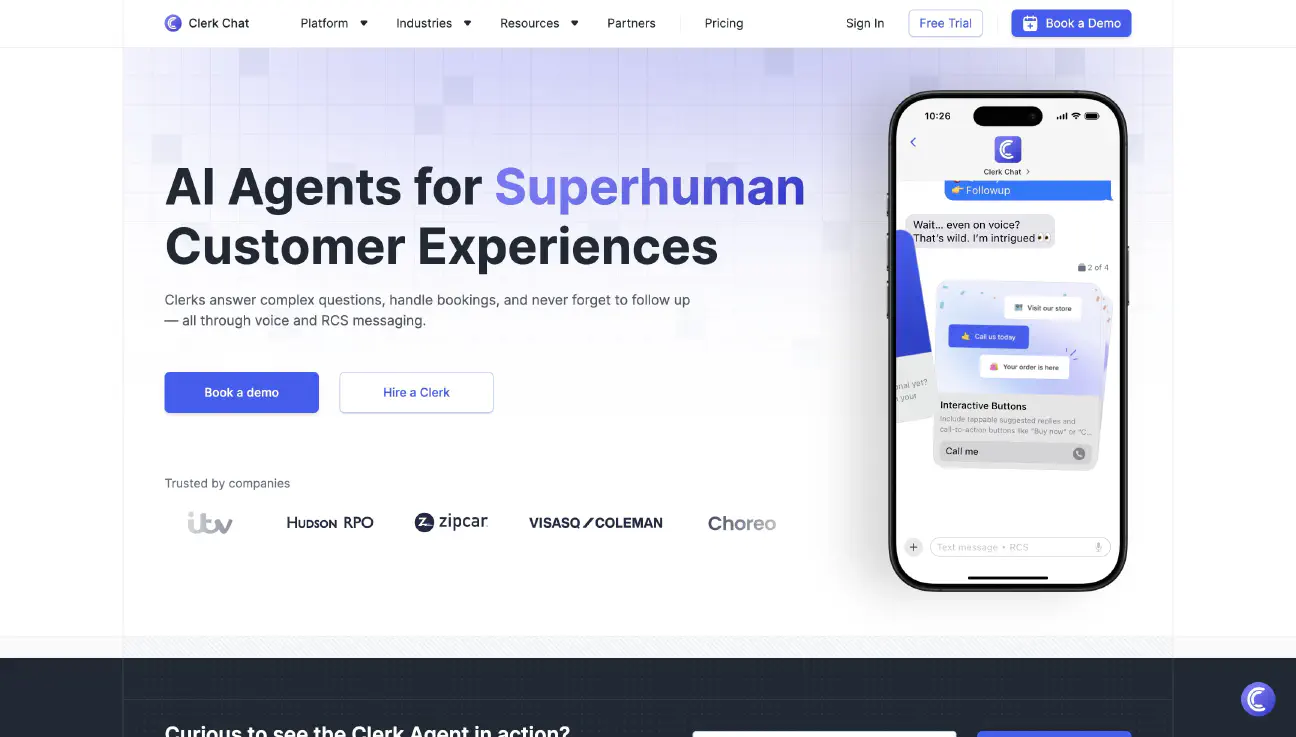
Best for: Sales teams running SMS outreach, qualification, and follow-up at scale
If your sales team lives in text threads, calendars, and CRMs, Clerk Chat is going to feel like an extension of your team, not another system to babysit. It’s not just a bot that replies to questions. It’s a full agentic AI system that can qualify leads, respond with tailored follow-up, and route conversations to human reps when it counts.
What stands out about Clerk isn’t is depth. You can build complete follow-up workflows (think: lead shows interest → AI texts offer → auto-schedules call) with full visibility into who clicked, replied, or converted. It also handles compliance seriously: FINRA, HIPAA, audit trails, opt-outs, it’s all covered.
If you’re looking to build lead qualification and appointment scheduling into SMS or chat without hiring another 10 reps, Clerk’s a strong pick.
| Pros | Cons |
|---|---|
| • 2-way SMS with CRM sync | • Not a visual chatbot UI, it’s messaging-first |
| • Built-in lead scoring and routing logic | • Slight learning curve for some |
| • Deep compliance + integrations with Salesforce, Teams, etc. | |
| • Customizable automated workflows | |
| • Affordable pricing |
Does your sales playbook include AI? It's time to rewrite your rules of engagement.
2. Zendesk AI Agents
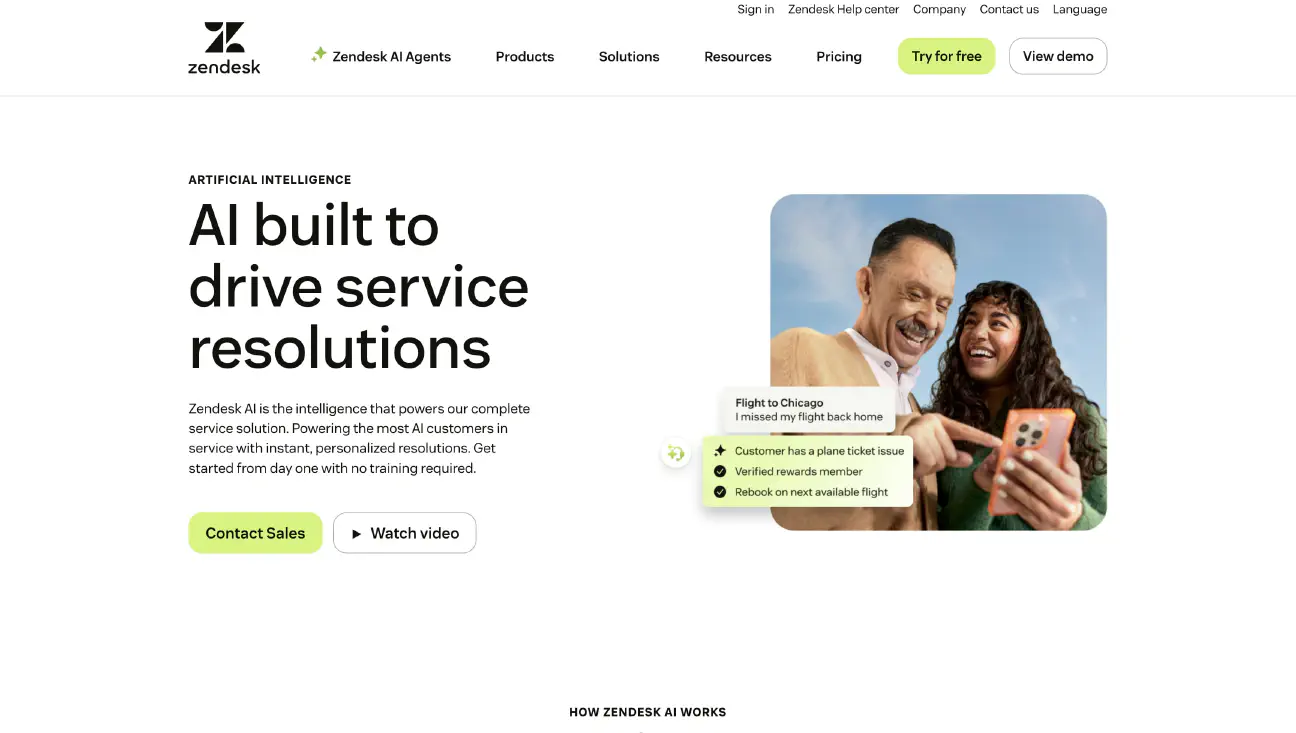
Best for: Support-heavy sales orgs who already use Zendesk and want smarter routing
Zendesk is better known for support than sales, but their AI suite is surprisingly capable, especially if your sales process involves live chat, email support, or high-touch onboarding. The answer bot can handle basic FAQs and triage, while their AI workflows can pre-qualify leads and move them into smart ticketing workflows or hand them off to an actual person when it matters.
What’s great here is the full system integration. The AI is native to Zendesk. So if you’re already tracking prospects or returning buyers through your help desk, the handoff from bot to rep is seamless. The AI can pull from your help center, knowledge base, and past interactions to give contextual replies.
You also get access to the massive Zendesk marketplace of integrations, which is a bonus if you’re trying to connect your AI assistant to tools like Slack, CRM, or analytics platforms.
| Pros | Cons |
|---|---|
| • Native to Zendesk ecosystem | • Best suited for orgs already on Zendesk |
| • Good for multi-channel (email, chat, social) sales pipelines | • Brand tone customization takes a little work |
| • Predictive answers get better with usage |
3. Tidio
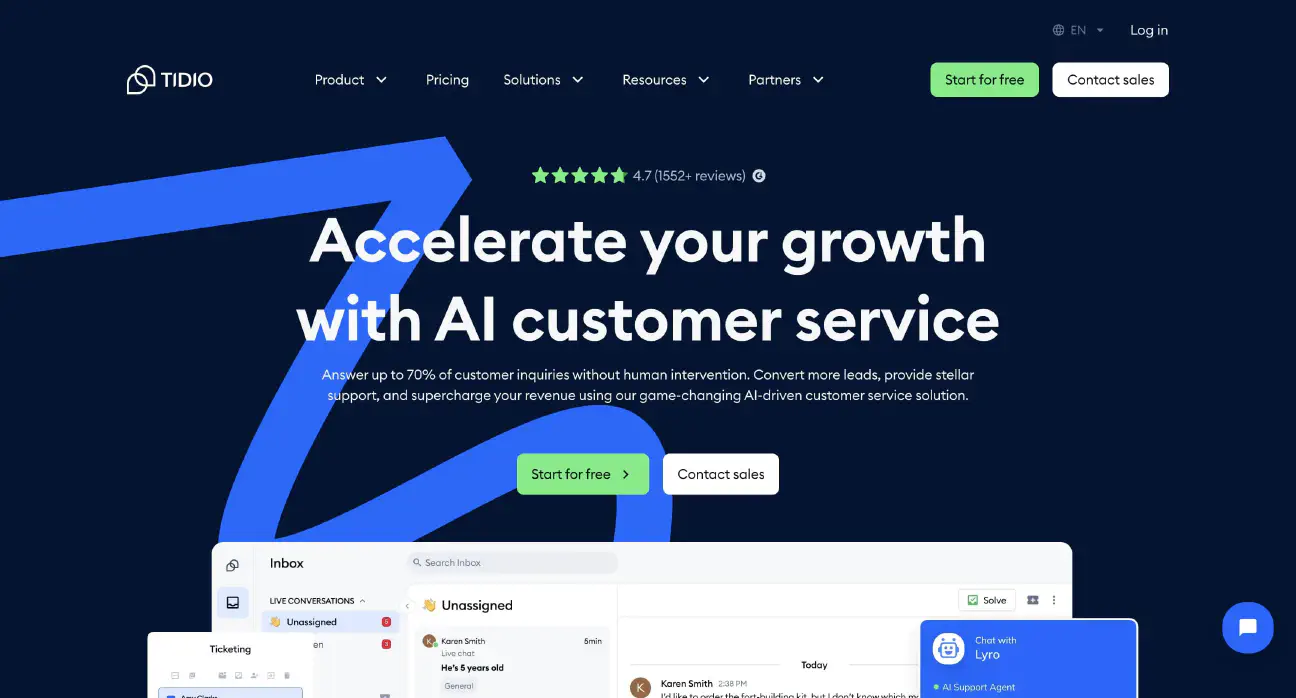
Best for: Small eCommerce teams looking for plug-and-play automation without the dev lift
If you’re an eCommerce brand juggling support, lead gen, and abandoned carts, Tidio offers a clean, affordable conversational AI for sales teams solution that you can launch in a day. It’s built for fast setup, with a simple drag-and-drop chatbot builder, smart templates for common use cases, and prebuilt product recommendation flows.
Tidio is focused on small to mid-sized businesses, especially DTC brands, and it does that really well. The AI (Lyro) uses NLU to understand basic queries, answer FAQs, and push discounts or cross-sells based on visitor behavior. Add in abandoned cart flows and chat triggers based on browsing, and you’ve got a bot that can drive real conversions, without a dev team.
It also supports multiple channels (Messenger, Instagram, email) and syncs with Shopify and WooCommerce, which makes it a great entry point for teams looking to test conversational AI lead generation in a real way.
| Pros | Cons |
|---|---|
| • Incredibly easy to set up | • Not designed for complex B2B funnels |
| • Built-in eCommerce logic and triggers | • Analytics are basic compared to larger players |
| • Affordable for small teams |
4. HubSpot Chatbots
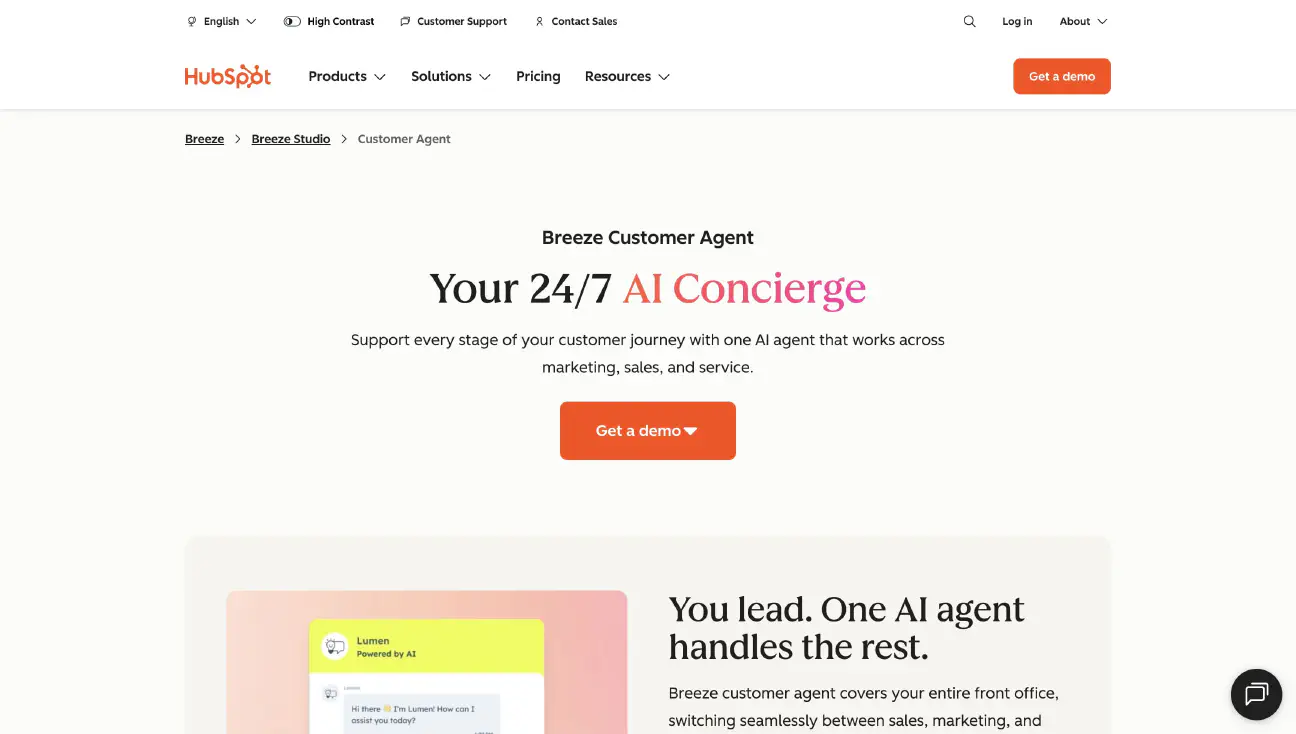
Best for: Sales and marketing teams already deep in the HubSpot ecosystem
HubSpot’s chatbot builder won’t win awards for innovation, but if your CRM, forms, automations, and email sequences already live in HubSpot, you’ll appreciate how tightly everything connects. The bots can automatically pull in contact data, offer personalized recommendations, route leads to the right reps, and trigger workflows based on chat behavior.
Like some of the other top conversational AI platforms, HubSpot is also experimenting with agentic AI, through its Breeze tools which allow companies to design virtual agents capable of handling everything from lead scoring to follow-up.
That said, the solution can be a little complicated to set up if you have complex workflows, and accessing full agentic AI capabilities can be expensive.
| Pros | Cons |
|---|---|
| • Built-in CRM sync and email automation | • Limited outside the HubSpot ecosystem |
| • Easy to route by lead score, industry, or funnel stage | • Pricing can be expensive |
| • Ideal for content-driven inbound sales funnels |
5. Ada
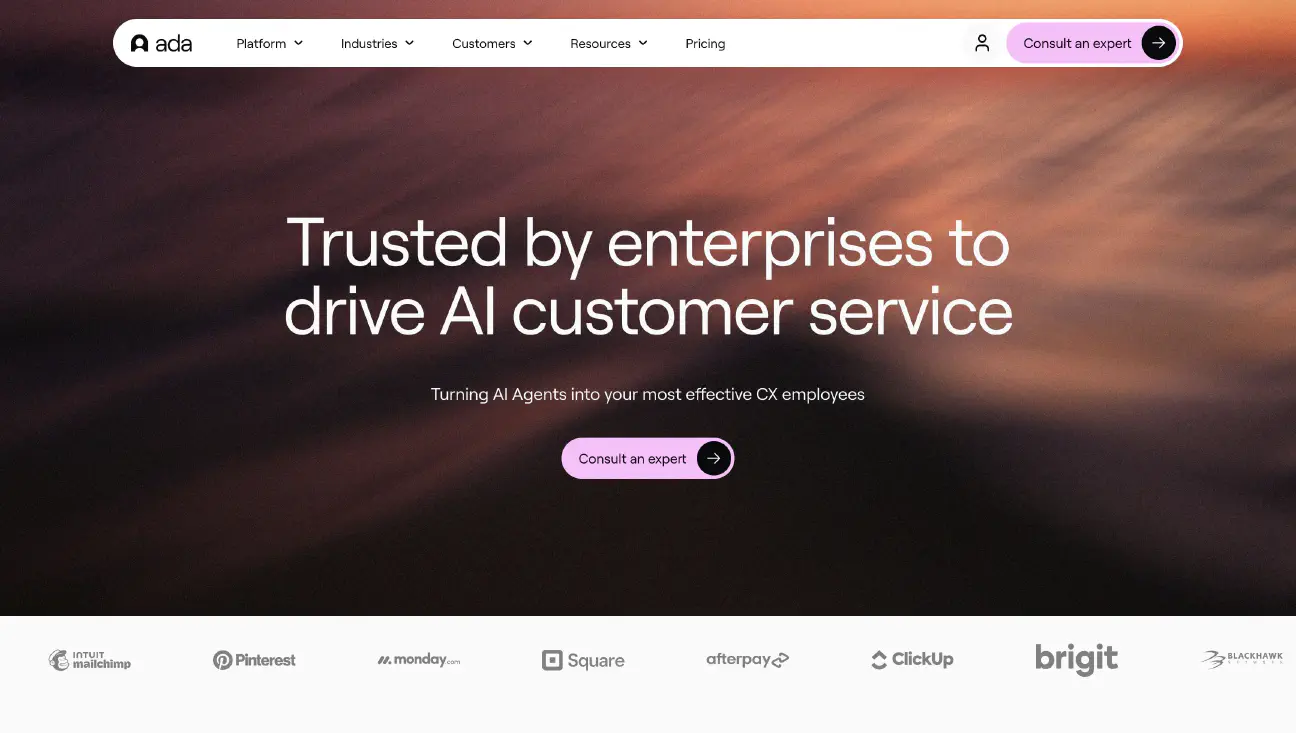
Best for: Large enterprise teams that need control over brand tone, localization, and automation depth
Ada is a name commonly associated with conversational AI for sales, particularly among big, complex companies that want conversational AI deeply embedded in both their sales and support ecosystems. Its strength is flexibility, you can build bots that actually sound like your brand, across multiple languages, and connect them to nearly any system using open APIs.
If you want to design an experience that feels personal, in tone, logic, timing, and flow, Ada gives you the tools. You can pull in user data, surface product recommendations, use brand voice and tone customization, and set up workflows that respond differently based on country, device, channel, or customer tier.
The chatbot system also works well with a range of channels, including social media platforms and phone systems. Notably, the analytics are a little tricky to navigate. It can take a while to figure out how to make the most of your reports.
| Pros | Cons |
|---|---|
| • Multi-language, enterprise-ready AI | • Pricing starts high and scales quickly |
| • Deep customization and brand control | • Limited reporting |
| • Great support + proactive account management |
6. Drift
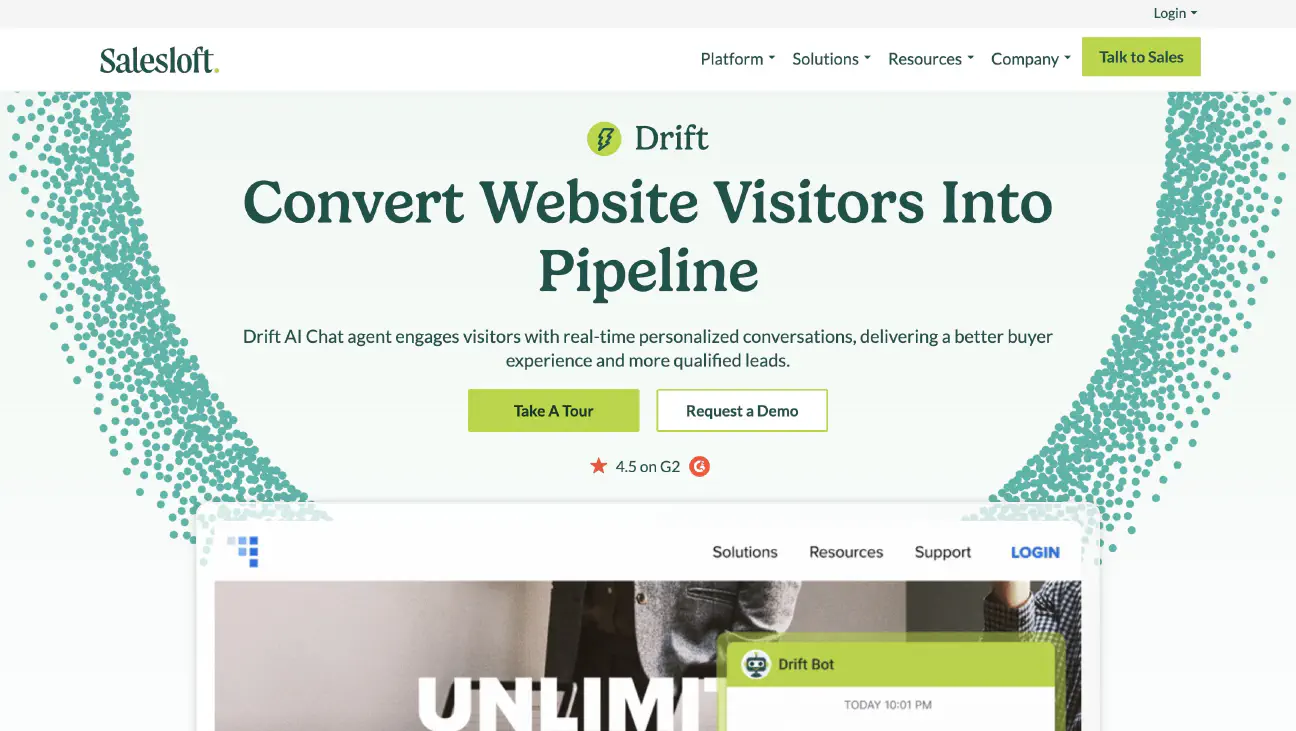
Best for: B2B teams focused on speed-to-lead and ABM targeting
Drift was one of the first companies to push conversational AI into the B2B sales motion, and it’s still one of the best if your priority is getting hot leads in front of reps fast. Its AI chat tools are designed to qualify visitors in real-time, personalize outreach based on company profile or behavior, and route them instantly to a meeting or rep.
Its conversational AI lead generation flows can tie into your account-based marketing data, so when someone from a target account lands on your site, Drift knows who they are, what to say, and how to move them to a meeting, often without human intervention.
The scheduling logic is excellent, and the bot-to-human transitions feel smooth, not clunky. It’s also strong on analytics, helping you see where people drop off, what questions get asked most, and how fast you’re getting to meetings.
| Pros | Cons |
|---|---|
| • Built for high-velocity B2B | • Expensive at scale |
| • Smart routing based on account + firmographics | • Can feel overly “salesy” if not tuned well |
| • Great for outbound + inbound |
7. Intercom
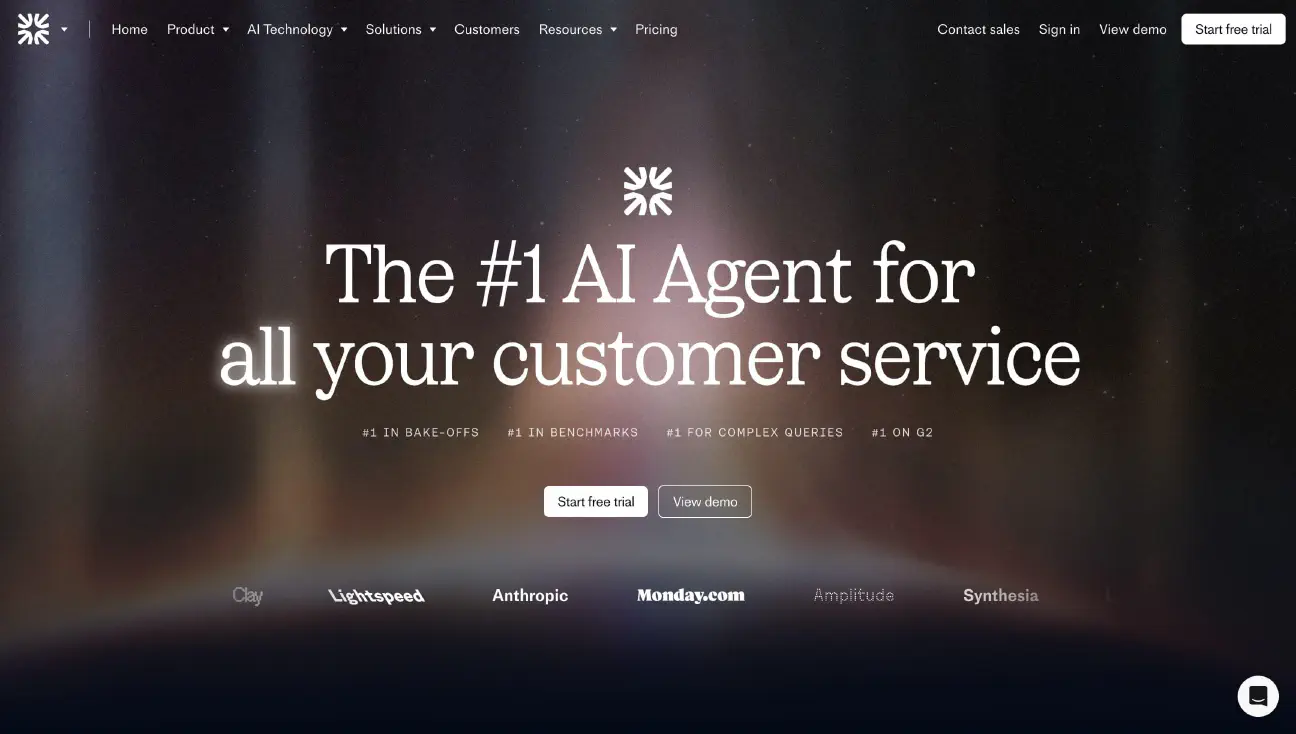
Best for: SaaS and product-led growth teams focused on onboarding and retention
Intercom isn’t just a chatbot tool, it’s a customer messaging platform that happens to have one of the best AI-powered chatbot experiences baked into its core. What makes it different is that it focuses on in-product engagement. That means nudges, onboarding flows, tour prompts, and support chat that happens inside your app or dashboard. right where the user is already active.
This is especially powerful for sales teams working with trials, freemium models, or complex onboarding processes. You can greet a new user in-app, guide them to the next step, answer questions, and hand off to a rep when needed, all in one seamless experience.
The platform also supports proactive messaging via chat, email, and product tours, and ties all of it back to contact records and behavioral triggers. Plus, their new GPT integrations give bots stronger response flexibility.
| Pros | Cons |
|---|---|
| • Excellent UI and UX | • Pricing gets steep as MAUs grow |
| • Best-in-class for PLG and SaaS | • Best results require product + growth team input |
| • Deep data tracking across lifecycle |
Conversational AI for Sales: Implementation Tips
If you’re excited by the benefits of conversational AI for sales, and you’re confident that you can overcome the challenges associated with platform integrations, bot maintenance, and employee training, there are plenty of great tools out there.
The key to success isn’t just choosing the right platform, but making sure you’re following the right chatbot best practices and implementation strategies to improve your ROI.
Here’s how to get started.
1. Consider your Specific Goals and Needs
First, ask yourself what you want to accomplish with conversational AI for sales teams. Are you looking for a solution that will help you automate your B2B text messaging strategy, allowing you to engage, follow up with leads, and answer their questions quickly?
Do you want a tool that can search through profiles and suggest which leads your team should be focusing on? Maybe you’re interested in creating an AI assistant for your reps that can guide them through sales strategies and help them close more deals with product recommendations.
Your use case will tell you what to prioritize.
- Want better human rep escalation? Prioritize calendar and team routing features.
- Need personalized messaging at scale? Look for GPT-powered tools or CRMs with deep context sync, and easyt-o-edit pre-designed templates.
- Running an eCommerce site? Go for bots with strong browsing behavior triggers and cart recovery flows.
Interview your top reps or SDRs. Ask: “What’s the most annoying task you’d offload to an AI right now?” Start there.
2. Assess Tools and Platforms Carefully
Next, examine the range of tools available for your specific use case. How you assess each platform will vary depending on your specific goals. Imagine, for instance, you’re looking for an AI sales SMS solution, like Clerk Chat. You’ll need to think about the features these platforms can offer.
For instance, do they enable you send personalized automated text messages to customers based on specific triggers or schedules? Do they give you access to an SMS bot that can answer customer questions 24/7, and even ask qualifying questions when you’re assessing leads?
Beyond looking at overall functionality, think about:
- Compliance and security: Which tools have the integrated features you need to ensure compliance? For instance, Clerk Chat offers end-to-end encryption, multi-factor authentication, and access to dynamic cohorts so you can track when customers opt-in and opt-out of receiving texts.
- Ease of use: How convenient are these solutions to access and customize? Clerk Chat, for example, makes it easy to get started with workflow text messaging, with convenient templates, and workflow builders. Look for systems that include a visual chatbot editor, drag-and-drop designer, and easy integration with your knowledge base.
- Scalability: Can the platform scale to suit your future needs? Does it support 3rd party apps integration, work with various messaging channels, and accommodate an unlimited number of contacts, leads, and endless customer data?
Remember customer support too. Some vendors offer access to a dedicated account manager and end-to-end guidance. Others make you figure everything out for yourself.
3. Integrate your Solution with Your Existing Tools
The power of conversational AI for sales really shines when you can embed these tools into your existing workflows and technology. You should be able to hook your bot and enterprise text messaging platform up to the tools you already use.
For instance, Clerk Chat gives you the ability to leverage SMS integrations for Microsoft Teams and so your team members can manage conversational AI flows from the platforms they already work with each day. It also allows you to link your system to archiving tools like Smarsh and Global Relay, so you can keep comprehensive records for compliance purposes.
Plus, the platform seamlessly integrates with CRM solutions like Salesforce, ensuring you can tap into customer data to personalize messages and AI interactions.
You don’t want to be stuck building workarounds just to pass data between systems. If it takes more than two hours to connect your CRM or calendar, that’s a red flag.
4. Implement in Stages: Don’t Go Full Automation Day One
The best AI rollouts start simple. You don’t need 20 flows for bots and live agents straight away. You need one really good one. For example:
- Auto-qualify leads on your pricing page
- Offer to schedule a demo based on fit
- Route to rep with full transcript and lead score
The right vendor offering conversational AI for sales teams should make it easy to get started. They help you design a personalized shopping experience, or customer service strategy based on consumer data, and existing conversational flows.
They’ll help you streamline multiple channel integration, and scale your strategy as your business evolves, without headaches. They’ll also ensure you can access the reports and analytics you need to figure out where you should go next.
5. Track Real Outcomes: Not Just Bot Stats
Clicks and opens don’t pay the bills. Sales do.
So make sure your AI connects to sales reports that show:
- Demo conversions from bot leads
- Qualification accuracy vs. human benchmarks
- Closed-won rates from AI-qualified accounts
- Drop-off points in key workflows
Take advantage of analytical solutions that can help you better understand user preferences, update your chatbot templates, and strengthen your results over time. Again, an automated customer experience (ACX) consultant, or service team should be able to help you here.
Future Trends: What’s Next for Sales AI?
Conversational AI is constantly evolving, introducing new opportunities for marketing, customer service, and sales teams. In the future, the opportunities for AI for B2B sales and B2C interactions will continue to grow as tools become more advanced and sophisticated.
Just like websites replaced brochures and CRMs replaced spreadsheets, conversational AI and advanced chatbot technology is quickly becoming the baseline for modern revenue teams. But where is it all headed? What does the next generation of sales tech look like?
1. From Chatbot to Sales Teammate
Today’s bots mostly answer questions and hand off to reps. But tomorrow’s will own entire stages of the funnel, not just respond to input.
That’s the shift toward agentic AI, where bots don’t just wait to be asked, they take initiative. Imagine a bot that notices a lead stalling in the pipeline, auto-generates a follow-up message, tweaks the offer based on CRM data, and schedules a new touchpoint.
You’ll still have reps guiding strategy. But the bot becomes a junior SDR, handling the grind work, freeing up humans to focus on closing. Learn more about agentic AI vs conversational AI here.
2. Multimodal AI Will Power Sales Conversations Everywhere
Today’s chatbot technology mostly lives in text bubbles, a chat box on a seller’s website, maybe some SMS. But that’s changing fast. The next generation of AI tools will operate across formats, transforming entire conversational sales strategies. They’ll handle:
- Voice (automated discovery calls)
- Video (AI-generated demo walk-throughs)
- Image (AI recognizing product interest from screenshots or uploads)
In an ecommerce setting, that could mean a customer sends a photo of a product and the AI replies with where to buy it, similar items, or bundle discounts. For mobile sales app development, bots will be embedded into native apps, not just web widgets.
3. Personalization at Global Scale
With tools like Clerk Chat already supporting localization and brand voice customization, we’re heading toward bots that speak to global consumers like locals.
Large enterprises operating across regions in the sales landscape will be able to deliver:
- Custom responses based on region, culture, and buying habits
- Sales reports segmented by buyer intent signals
- Adaptive flows based on prior product exposure
Plus, cutting-edge conversational AI for sales will be able to gather more data from each customer, scoring leads based on sentiment and emotion in the moment, and adjusting conversations, price breakdowns, and recommendations accordingly.
Clerk Chat: Convenient Conversational AI for Sales
Ready to unlock the benefits of conversational AI for your sales teams? Start simple, with a comprehensive solution designed to empower your workforce, enhance productivity, improve customer satisfaction, and boost sales.
Clerk Chat’s comprehensive business messaging platform gives businesses access to a suite of tools they can use to strengthen connections with customers. You can use the Clerk AI assistant to create sales text messages personalized to the needs of your customers, and send them to leads automatically. The intelligent bot can handle two-way conversations too.
For instance, it can respond to customer queries, guide them towards products based on their profile data, and even close deals on a sales professional’s behalf. Plus, Clerk Chat’s reporting and analytics tools are also enhanced by AI, ensuring you can make intelligent data-driven decisions that facilitate ongoing business growth.
If you’re ready to see what conversational AI can really do for the sales landscape, there’s never been a better time to get started.
Will’s latest superpower is building innovative AI solutions to add value for clients. He's passionate about all things AI, entrepreneurship, and enjoys staying active with sports and outdoor activities.
In this article:
- What is Conversational AI for Sales?
- The Use Cases of Conversational AI for Sales Teams
- The Benefits of Conversational AI in Sales
- Challenges of Using Conversational AI in Sales
- The Best Conversational AI Solutions for Sales Teams
- Conversational AI for Sales: Implementation Tips
- Future Trends: What’s Next for Sales AI?
- Clerk Chat: Convenient Conversational AI for Sales
Ready to use your business number for text messaging?
Thousands of businesses are already experiencing the power of conversational messaging through SMS. Join us. Free trial and paid tiers available.
Get Started#Subscribe
Get product updates in your inbox
Tutorials, features, and Clerk Chat news delivered straight to you.
